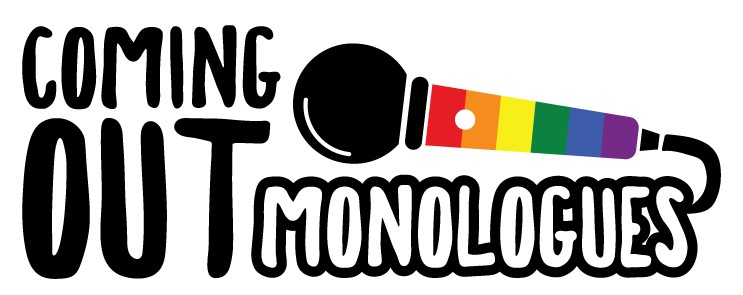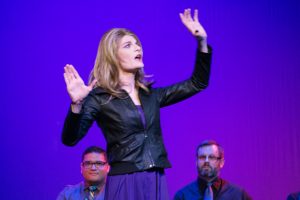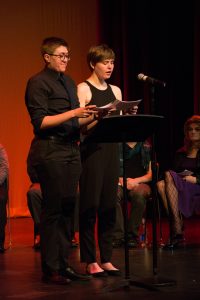“We’re Not All The Same:” The Coming Out Monologues
How the Coming Out Monologues, an event started by a former English student more than 10 years ago, continues to highlight LGBTQ+ stories to promote an inclusive Aggie narrative.

Story by Sarah Roberts ’21
For more features like this one, head over to The English Aggie blog!
The stage lights shine. A hush falls over the audience. Performers await their cue. Unlike typical plays, the performance about to begin will profoundly impact the audience members and performers, alike. This is the Coming Out Monologues. Hosted around the country by numerous college campuses, this event usually takes place in early April at Texas A&M University to celebrate LGBTQ+ Awareness Month. According to Texas A&M’s LGBTQ+ Pride Center, the experience is “raw, inspiring, transformative, and intimate.”
The Coming Out Monologues was originally created by Nancy Tubbs, a College Station native who graduated from Texas A&M with a degree in English. She started the event while she was the coordinator for University of California-Riverside’s LGBTQ+ Resource Center. The first Coming Out Monologues was held in 2007 on UC-Riverside’s campus. The event’s concept was inspired by The Vagina Monologues, an episodic play by V (formerly Eve Ensler), and was intended to give LGBTQ+ students a platform to share authentic stories to amplify LGBTQ+ voices.
Inclusivity and the Aggie Narrative
The first Coming Out Monologues event on Texas A&M’s campus was performed around 10 years ago, and since then, the event has grown substantially. The LGBTQ+ Pride Center now supports efforts to put on the event every year, and the event has received multiple sponsorships, including from the Department of English. Last year’s performance was virtual due to COVID-19 safety concerns, as will be this year’s performance. Directors of the event hope to return to Rudder Theater, where it was originally located, as soon as next year.
Dr. Kris May from the Department of English currently serves as a Co-Director for the event, along with Dr. Jesse O’Rear from the Department of Performance Studies. To Dr. May, who also performed in the first Coming Out Monologues event at Texas A&M 10 years ago, the event is important to promoting inclusivity on campus: “The Coming Out Monologues is a way to bring visibility and attention to the LGBTQ+ population here. Something that the students who work with the Coming Out Monologues are invested in saying is, ‘I really am an Aggie, this is who I am, and I don’t fit into these boxes and stereotypes.’ They really want to make Aggie a more inclusive term.”
Dr. May says this event, which is one of the most visible LGBTQ+ events on campus, focuses on stories that are potentially hidden or overlooked: “For people who have felt like they’ve never been able to share their stories or have not been encouraged to share their stories, they can enter this space with the Coming Out Monologues where their story is appreciated. They realize that they do have something to say and their stories are valuable.”
Center Stage
While the performers at the Coming Out Monologues are generally LGBTQ+ students, being a student is not a prerequisite to performing. Past performers have included LGBTQ+ alumni, faculty, staff, community members, and friends and family who are LGBTQ+ allies seeking to learn more about how to support their loved ones. According to Dr. May, the Coming Out Monologues is for anyone with a story, no matter how complicated it may seem: “I think any LGBTQ+ person, any and all of them, have stories. Anyone who is or has struggled with some issues [with their identity], and maybe aren’t LGBTQ+ but are trying to figure it out…has an important story to tell….Allies who have stories that involve LGBTQ+ people, and how they’ve supported them…that’s part of the overall story as well.”
All of these stories are not only a mechanism for performers to process and articulate their struggle, pride, or otherwise emotional journey tied to their identity–it’s also highly impactful for audience members as well. In Dr. May’s experience co-directing the event, there have been multiple students who were inspired to perform because they participated as an audience member in a previous year: “Something that’s always really noticeable to me, even in the early days, is after the performance walking around and hearing people’s conversations as they’re leaving or as they’re coming up to meet the performers–it really makes an impression on so many of the audience members.”
Developing the Story 
As Co-Directors of the Coming Out Monologues, Dr. May and Dr. O’Rear conduct multiple workshops throughout the academic year to help students refine their pieces before submitting a final version to perform. According to Dr. May, the benefits of the writing process and reading different perspectives in literature can be essential for students grappling for insight into who they are and how they define their identity: “Just the process of writing and telling your story can give those moments where you have some incredible insights about yourself. In reading a story, you’re also thinking about your own life, your own experience, and how you relate to the world that makes that really meaningful….Some aspects might be completely different from you, but yet you still maybe shared an identity with that character in the book or the writer, so you’re broadening your horizons.”
While Dr. May helps students write their pieces to submit to the Coming Out Monologues, he also stresses that students who don’t want to write can still perform: “[Performances] can start with a photo, maybe a photo you took. It could start with a self-portrait or any piece of artwork that you’ve done, a piece of music that you’ve performed that maybe you didn’t write. Some people are intimidated or nervous about putting words down, but those can be another person’s words, or they don’t have to be words, you could start with just an image.”
Working with students to develop these stories is a task that Dr. May finds very rewarding. According to him, the success of the Coming Out Monologues can be entirely afforded to the hard work of the LGBTQ+ Pride Center, and the students who participate in the event: “It’s a really exciting process for me to see and have every year. There’s always something that’s surprising. It’s great to see those new things come through every year.”
How to Attend
This year’s performance of the Coming Out Monologues will take place virtually on April 2nd at 7:00pm. The performance will be livestreamed on the LGBTQ+ Pride Center’s Facebook page.
